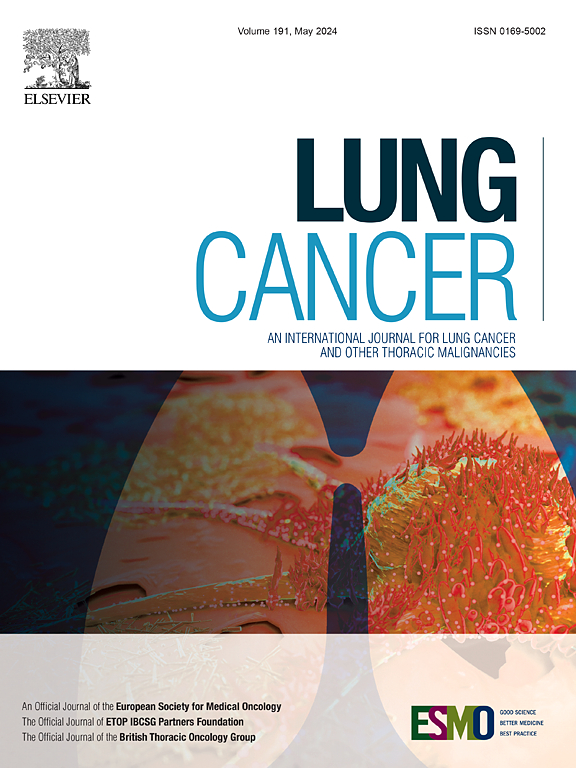第三代EGFR- tkis治疗非小细胞肺癌中罕见的EGFR外显子19缺失-插入突变的预后意义
IF 4.4
2区 医学
Q1 ONCOLOGY
引用次数: 0
摘要
目的:不同表皮生长因子受体(EGFR)突变对不同EGFR酪氨酸激酶抑制剂(EGFR- tki)的敏感性差异显著。该研究评估了EGFR外显子19缺失插入(19delins)的晚期非小细胞肺癌(NSCLC)患者对第三代EGFR- tkis作为一线或二线治疗的生存结果。方法:我们回顾性分析了2020年3月至2024年7月期间215例检测到EGFR 19delins的患者的临床、分子和生存数据。为了评估无进展生存期,采用1:1倾向评分匹配方法,选择57例接受一线第三代EGFR- tkis治疗的EGFR 19del患者(队列A)和48例接受与二线治疗相同治疗的患者(队列B)作为对照组。结果:共鉴定出39个独特的EGFR 19delins基因型,其中l747_p753delinsss(34.0%)、L747_A750delinsP(18.1%)和E746_S752delinsV(9.8%)占前3位。EGFR 19delins患者的中位PFS明显短于普通exon19del患者(一线,12.9个月vs 19.7个月,p = 0.0039;二线,7.9个月vs 10.5个月,p = 0.0387)。探索性分析表明,L747_P753delinsS可能与较差的预后相关,而E746_S752delinsV似乎与第三代EGFR-TKIs具有更好的预后,这一发现需要进一步验证。结论:这些研究结果表明,与普通EGFR 19del突变患者相比,EGFR 19del突变患者从第三代EGFR- tki治疗中获得的临床获益有限,这表明该患者群体需要最佳治疗方案。本文章由计算机程序翻译,如有差异,请以英文原文为准。
Prognostic implications of uncommon EGFR exon 19 deletion-insertion mutations in non-small cell lung cancer treated with third-generation EGFR-TKIs
Purpose
The sensitivity of various epidermal growth factor receptor (EGFR) mutations to different EGFR tyrosine kinase inhibitors (EGFR-TKI) varies significantly. This study evaluated the survival outcomes of patients with advanced non-small cell lung cancer (NSCLC) harboring EGFR exon 19 deletion-insertion (19delins) to third-generation EGFR-TKIs administered as first- or second-line therapy.
Methods
We retrospectively analyzed clinical, molecular, and survival data from 215 patients detected with EGFR 19delins between March 2020 and July 2024. To evaluate progression-free survival, 57 patients with EGFR 19del who received first-line third-generation EGFR-TKIs (cohort A), and 48 patients who received the same treatment as second-line therapy (cohort B) were selected using 1:1 propensity score matching and served as control group.
Results
Thirty-nine unique EGFR 19delins genotypes were identified, with L747_P753delinsS (34.0 %), L747_A750delinsP (18.1 %), and E746_S752delinsV (9.8 %) being the top three variants. Patients with EGFR 19delins had significantly shorter median PFS compared with patients with common exon19del (first-line, 12.9 vs. 19.7 months, p = 0.0039; second-line, 7.9 vs. 10.5 months, p = 0.0387). Exploratory analyses indicated that L747_P753delinsS might be associated with poorer prognosis, while E746_S752delinsV appeared to show better outcomes with third-generation EGFR-TKIs, findings that require further validation.
Conclusion
These findings show real-world evidence that patients with EGFR 19delins derive limited clinical benefit from third-generation EGFR-TKI therapy compared to those with common EGFR 19del mutations, suggesting the need for optimal treatment regimen in this patient population.
求助全文
通过发布文献求助,成功后即可免费获取论文全文。
去求助
来源期刊

Lung Cancer
医学-呼吸系统
CiteScore
9.40
自引率
3.80%
发文量
407
审稿时长
25 days
期刊介绍:
Lung Cancer is an international publication covering the clinical, translational and basic science of malignancies of the lung and chest region.Original research articles, early reports, review articles, editorials and correspondence covering the prevention, epidemiology and etiology, basic biology, pathology, clinical assessment, surgery, chemotherapy, radiotherapy, combined treatment modalities, other treatment modalities and outcomes of lung cancer are welcome.
 求助内容:
求助内容: 应助结果提醒方式:
应助结果提醒方式:


